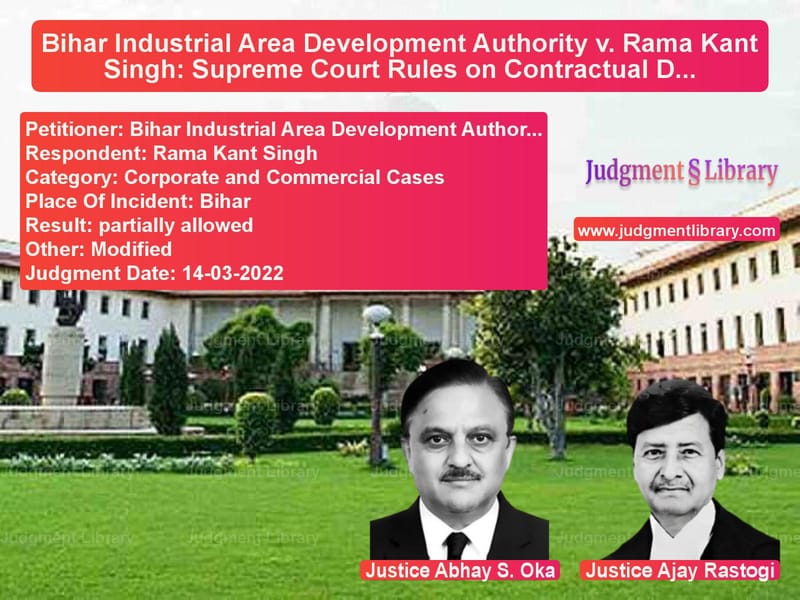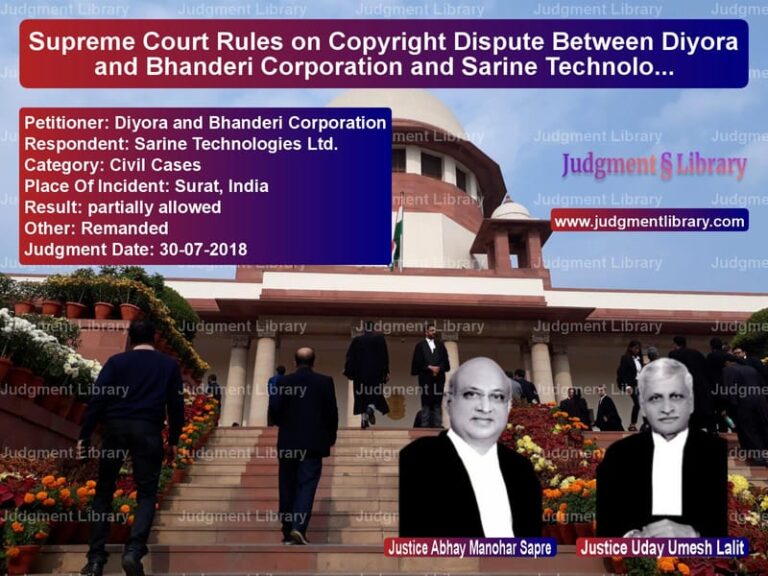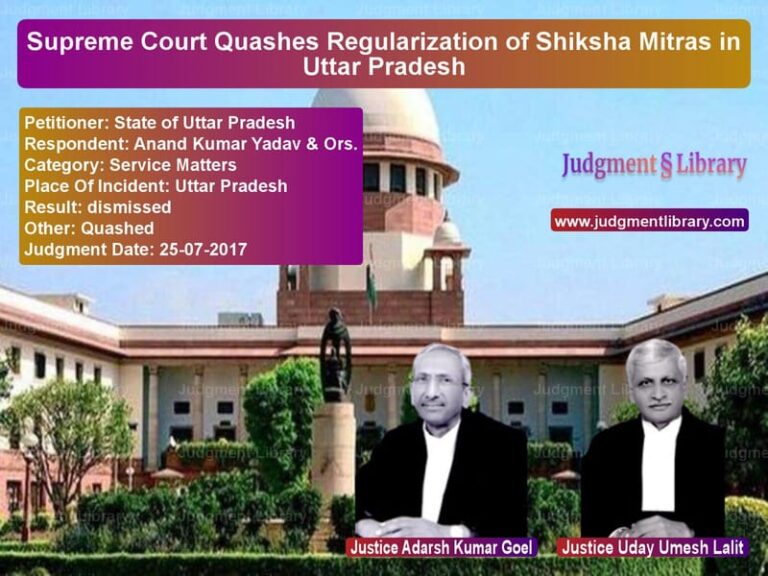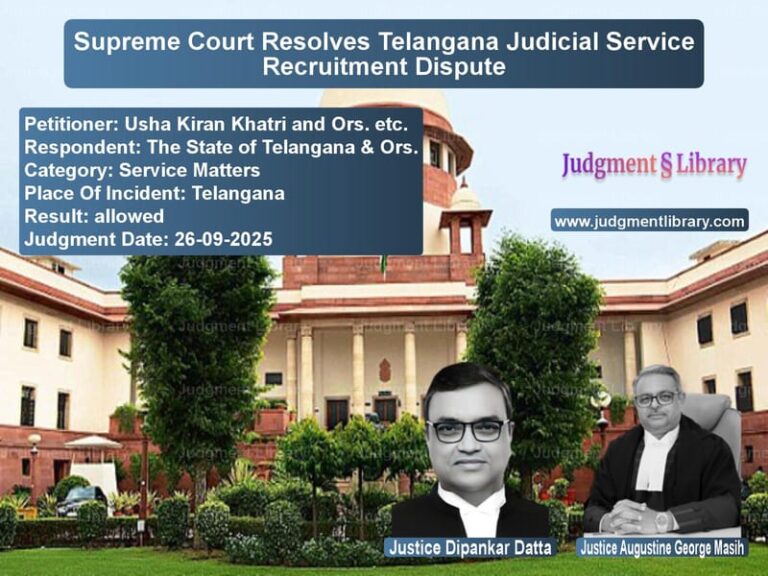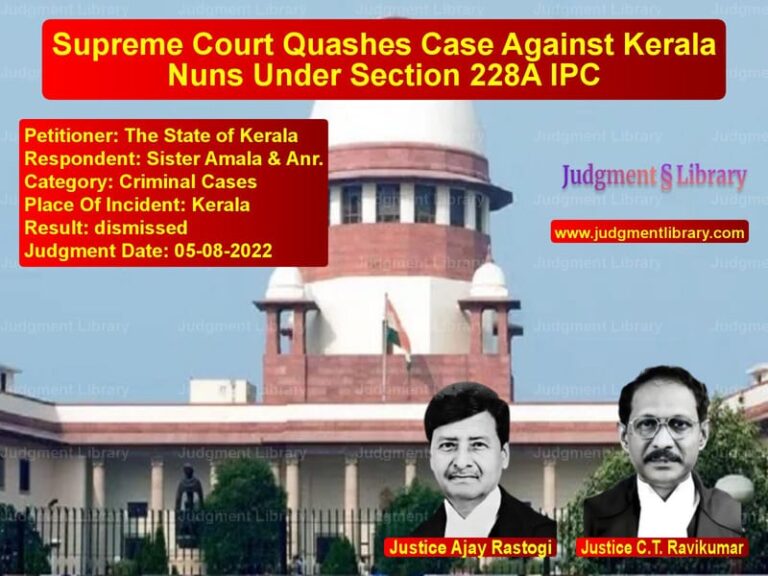Bihar Industrial Area Development Authority v. Rama Kant Singh: Supreme Court Rules on Contractual Dispute and Arbitration
The case of Bihar Industrial Area Development Authority & Others vs. Rama Kant Singh revolves around a contractual dispute regarding the forfeiture of earnest money and security deposit following the termination of a contract for drainage work. The Supreme Court addressed issues related to the Bihar Public Works Contracts Disputes Arbitration Tribunal Act, 2008 and the applicability of the Limitation Act, 1963 for the reference to the Arbitration Tribunal.
This judgment is significant as it clarifies the procedures for invoking arbitration in public works contracts and the scope of judicial intervention in awards made by an arbitration tribunal.
Background of the Case
The appellant, the Bihar Industrial Area Development Authority (BIADA), invited tenders for the construction of a drainage system in an industrial area. The respondent, Rama Kant Singh, was awarded the contract, which was formalized through an agreement signed in December 2007. However, the contract was later terminated, and the earnest money and security deposit paid by the respondent were forfeited. The respondent challenged the termination and forfeiture before the Arbitration Tribunal.
The Arbitration Tribunal ruled in favor of the respondent, granting him refunds of the earnest money and security deposit, along with interest. The appellant challenged the tribunal’s decision before the High Court under Section 13 of the Bihar Public Works Contracts Disputes Arbitration Tribunal Act, 2008.
The High Court upheld the tribunal’s award, leading the appellant to file an appeal before the Supreme Court, raising issues related to the limitation period for the reference to the tribunal and the legality of the award.
Legal Issues Considered
- Whether the respondent’s reference to the Arbitration Tribunal was barred by the limitation period.
- The applicability of the Limitation Act, 1963 to the arbitration proceedings under the 2008 Act.
- Whether the Arbitration Tribunal had the power to refund the earnest money and security deposit after the termination of the contract.
- Whether interest at the rate of 10% per annum was justifiably granted on the amounts due.
Petitioner’s Arguments (Bihar Industrial Area Development Authority)
- The dispute arose on June 8, 2010, when the agreement was terminated, and the respondent’s earnest money and security deposit were forfeited.
- The reference to the Arbitration Tribunal was made in March 2013, beyond the one-year limitation period prescribed under Section 9 of the 2008 Act.
- The reference application filed by the respondent was erroneous in claiming it was filed within the limitation period.
- The Arbitration Tribunal did not have the power to award a refund of the earnest money and security deposit.
- The interest rate of 10% per annum was unjustified, as the payments made were contractual in nature.
Respondent’s Arguments (Rama Kant Singh)
- The respondent argued that the Arbitration Tribunal had the power to extend the limitation period under Section 18 of the 2008 Act and that the delay in referring the matter was explained.
- The respondent’s reference was not barred by limitation because the dispute regarding the forfeiture of the earnest money and security deposit arose after the termination notice was issued.
- There was no provision in the contract that allowed the forfeiture of the earnest money and security deposit without clear grounds.
- The award of interest at the rate of 10% per annum was justified, as the appellant had delayed the payment of dues.
Supreme Court’s Judgment
The Supreme Court bench, comprising Justices Abhay S. Oka and Ajay Rastogi, ruled on the matter after considering the arguments put forth by both parties.
1. Limitation Period for Reference to the Arbitration Tribunal
“The reference to the Arbitration Tribunal was made in March 2013, more than two years after the dispute arose. However, the delay was justified under the provisions of Section 18 of the 2008 Act.”
The Court held that the Arbitration Tribunal has the power to condone delays in referring disputes beyond the limitation period, provided the party can show sufficient cause for the delay.
2. Arbitration Tribunal’s Jurisdiction to Refund Earnest Money and Security Deposit
“The Arbitration Tribunal interpreted the contract and concluded that there was no clause allowing the forfeiture of the earnest money and security deposit. The tribunal had the jurisdiction to order the refund.”
The Court agreed with the Tribunal’s finding that there was no provision in the contract that allowed the forfeiture of the amounts in question.
3. Interest Awarded by the Arbitration Tribunal
“The Tribunal rightly awarded interest at the rate of 10% per annum on the unpaid amounts, but the Court finds that interest should be payable only from the date of the reference to the Arbitration Tribunal, not from earlier dates.”
The Court modified the Tribunal’s award on interest, ruling that interest should only be payable from the date the respondent made the reference to the Arbitration Tribunal.
4. Modification of the Award
“The appeal is partly allowed, and the award made by the Arbitration Tribunal is modified only to the extent of interest granted on the claims.”
The Court directed that the amounts awarded in the Tribunal’s decision should be paid within three months, and if the payment was delayed, interest at 10% per annum would be applicable from the date of reference.
Key Takeaways from the Judgment
- The Supreme Court upheld the Arbitration Tribunal’s jurisdiction to award refunds for earnest money and security deposit.
- The Court emphasized that limitation periods can be extended if the party can demonstrate sufficient cause for delay in referring a dispute to arbitration.
- Interest is payable on claims from the date the dispute is referred to the Arbitration Tribunal, not before.
- The ruling reinforces the legal validity of arbitration proceedings and the enforceability of awards made under the Bihar Public Works Contracts Disputes Arbitration Tribunal Act, 2008.
Implications of the Verdict
This ruling has significant implications for arbitration in public works contracts:
- It ensures that parties to a dispute under public contracts are not unjustly deprived of their legal rights due to procedural technicalities.
- The judgment clarifies the scope of the Arbitration Tribunal’s powers in resolving disputes and awarding compensation or refunds.
- The ruling sets a precedent for extending limitation periods in cases where there is a reasonable explanation for delay.
Overall, this Supreme Court judgment strengthens the legal framework surrounding public works contracts and arbitration, ensuring that disputes are resolved fairly and justly.
Petitioner Name: Bihar Industrial Area Development Authority.Respondent Name: Rama Kant Singh.Judgment By: Justice Abhay S. Oka, Justice Ajay Rastogi.Place Of Incident: Bihar.Judgment Date: 14-03-2022.
Don’t miss out on the full details! Download the complete judgment in PDF format below and gain valuable insights instantly!
Download Judgment: bihar-industrial-are-vs-rama-kant-singh-supreme-court-of-india-judgment-dated-14-03-2022.pdf
Directly Download Judgment: Directly download this Judgment
See all petitions in Company Law
See all petitions in Corporate Compliance
See all petitions in unfair trade practices
See all petitions in Bankruptcy and Insolvency
See all petitions in Mergers and Acquisitions
See all petitions in Judgment by Abhay S. Oka
See all petitions in Judgment by Ajay Rastogi
See all petitions in partially allowed
See all petitions in Modified
See all petitions in supreme court of India judgments March 2022
See all petitions in 2022 judgments
See all posts in Corporate and Commercial Cases Category
See all allowed petitions in Corporate and Commercial Cases Category
See all Dismissed petitions in Corporate and Commercial Cases Category
See all partially allowed petitions in Corporate and Commercial Cases Category

